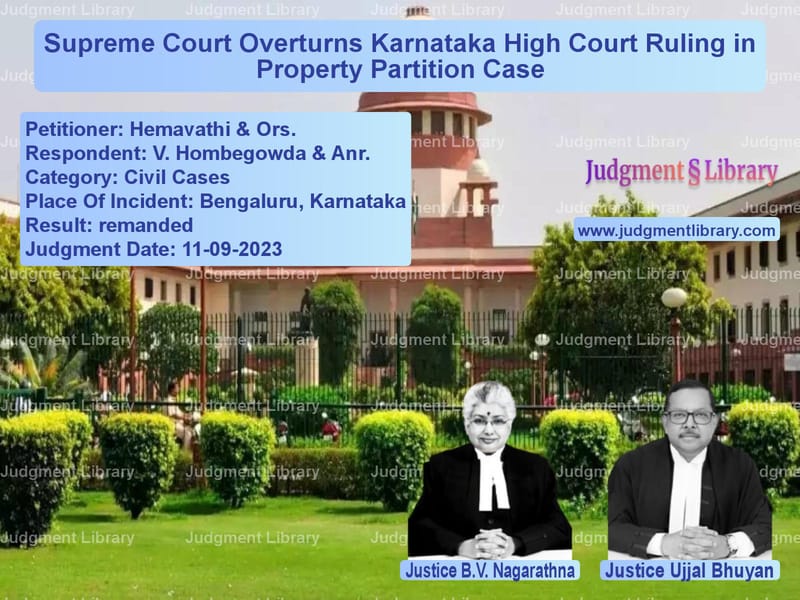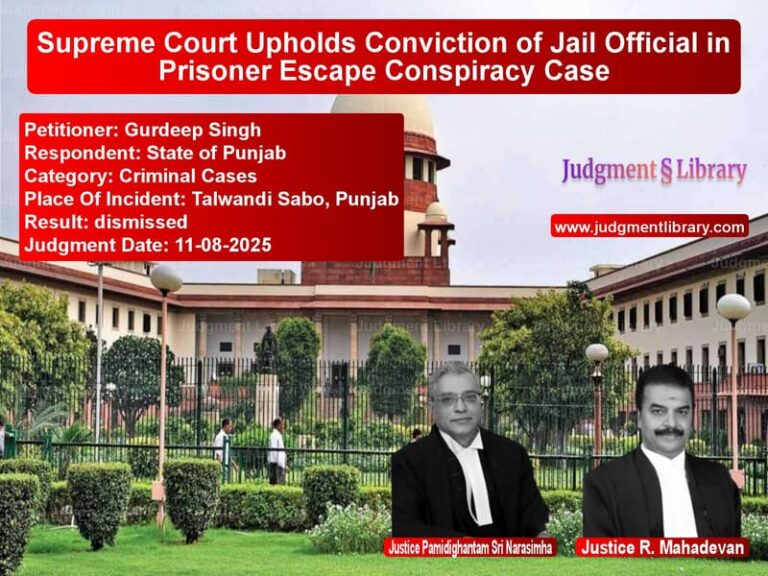Supreme Court Overturns Karnataka High Court Ruling in Property Partition Case
The Supreme Court of India recently delivered a significant ruling in the case of Hemavathi & Ors. vs. V. Hombegowda & Anr., setting aside the Karnataka High Court’s judgment in a property partition dispute. The case involved procedural irregularities, including the failure to frame substantial questions of law before allowing a second appeal, and non-compliance with due process, such as hearing all respondents before delivering a verdict.
Background of the Case
The dispute arose over a partition suit, Original Suit No. 552/2003, filed before the II Additional Senior Civil Judge, Bengaluru Rural District. The plaintiffs (appellants) sought partition and separate possession of their respective shares in the suit property. On 7 February 2012, the trial court ruled in favor of the plaintiffs, granting each of them a one-fourth share.
The defendants, dissatisfied with the trial court’s decision, filed a delayed appeal, Regular Appeal No. 1/2021, before the II Additional Senior Civil Judge, seeking condonation of a massive 2945-day delay (approximately eight years). The appellate court dismissed the delay petition and consequently the appeal itself, thereby upholding the trial court’s decree.
Unwilling to accept this outcome, the defendants approached the Karnataka High Court through Regular Second Appeal No. 291/2022, challenging the dismissal of their first appeal.
Karnataka High Court’s Decision
The High Court, in a surprising turn, allowed the second appeal at the admission stage without framing any substantial questions of law, a requirement under Section 100 of the Code of Civil Procedure (CPC). It condoned the 2945-day delay and remanded the case directly to the trial court for fresh adjudication. The High Court directed the trial court to:
- Permit the defendants to file an additional written statement.
- Frame additional issues if necessary.
- Re-record evidence from both parties.
- Decide the case within six months.
The court also ordered all parties to maintain status quo regarding the property.
Petitioners’ Arguments Before the Supreme Court
The appellants (original plaintiffs) challenged the Karnataka High Court’s ruling before the Supreme Court, raising the following key points:
- The High Court violated Section 100 of the CPC by allowing the second appeal without framing substantial questions of law.
- The respondents (plaintiffs in the trial court) were not given an opportunity to be heard, which violated principles of natural justice.
- The condonation of a 2945-day delay was unjustified and contrary to settled legal principles.
- The High Court should have remanded the case to the first appellate court, not the trial court.
Supreme Court’s Observations
The Supreme Court, comprising Justices B.V. Nagarathna and Ujjal Bhuyan, agreed with the appellants and noted several glaring errors in the High Court’s judgment.
1. Failure to Frame Substantial Questions of Law
The Supreme Court emphasized that a second appeal can only be entertained if substantial questions of law are framed at the admission stage. The High Court, however, admitted and allowed the appeal without framing such questions. The Court reiterated:
Read also: https://judgmentlibrary.com/supreme-court-restores-criminal-proceedings-in-dishonored-cheque-case/
“A second appeal cannot be entertained merely on equitable grounds. It lies only on a substantial question of law.”
2. Violation of Principles of Natural Justice
The Supreme Court noted that key respondents were neither issued notice nor heard before the High Court passed its order. The Court ruled:
“An appellate court must ensure that all parties are given an opportunity to be heard before passing any order affecting their rights.”
3. Unjustified Condonation of Delay
The Court criticized the High Court for condoning an excessive 2945-day delay without proper justification. It stated:
“Litigation must have finality. Inordinate delays cannot be condoned without cogent reasons, as it defeats the very purpose of judicial proceedings.”
4. Improper Remand to the Trial Court
The Supreme Court observed that the High Court had remanded the case to the trial court, bypassing the first appellate court, which was legally incorrect. It clarified:
“If the High Court found reason to condone the delay, it should have remanded the matter to the first appellate court for consideration on merits, not the trial court.”
Supreme Court’s Verdict
The Supreme Court set aside the Karnataka High Court’s ruling and remanded the case back to the High Court for fresh consideration in line with proper legal procedures. The Court directed:
- The High Court must frame substantial questions of law before proceeding with the second appeal.
- All parties must be given an opportunity to be heard.
- The High Court should re-evaluate whether the delay in filing the first appeal should be condoned.
- If the delay is condoned, the matter should be remanded to the first appellate court, not the trial court.
Impact of the Judgment
This ruling serves as a reminder of the importance of procedural adherence in appellate matters. Key takeaways include:
- Adherence to Section 100 CPC: The ruling reinforces that second appeals must be entertained only on substantial questions of law.
- Upholding Natural Justice: Courts must ensure that all affected parties are given a fair hearing before passing orders.
- Finality in Litigation: Excessive delays cannot be condoned without strong, justifiable reasons.
- Proper Forum for Appeal: Remand orders must direct cases to the correct judicial forum.
Conclusion
The Supreme Court’s ruling in this case ensures that procedural laws are not circumvented and that justice is administered fairly. By overturning the Karnataka High Court’s erroneous judgment, the apex court has reinforced the fundamental principles of appellate jurisprudence, ensuring that second appeals adhere to strict legal scrutiny.
Petitioner Name: Hemavathi & Ors..Respondent Name: V. Hombegowda & Anr..Judgment By: Justice B.V. Nagarathna, Justice Ujjal Bhuyan.Place Of Incident: Bengaluru, Karnataka.Judgment Date: 11-09-2023.
Don’t miss out on the full details! Download the complete judgment in PDF format below and gain valuable insights instantly!
Download Judgment: hemavathi-&-ors.-vs-v.-hombegowda-&-anr.-supreme-court-of-india-judgment-dated-11-09-2023.pdf
Directly Download Judgment: Directly download this Judgment
See all petitions in Property Disputes
See all petitions in Contract Disputes
See all petitions in Succession and Wills
See all petitions in Judgment by B.V. Nagarathna
See all petitions in Judgment by Ujjal Bhuyan
See all petitions in Remanded
See all petitions in supreme court of India judgments September 2023
See all petitions in 2023 judgments
See all posts in Civil Cases Category
See all allowed petitions in Civil Cases Category
See all Dismissed petitions in Civil Cases Category
See all partially allowed petitions in Civil Cases Category







